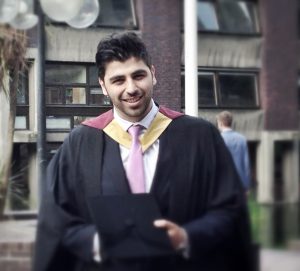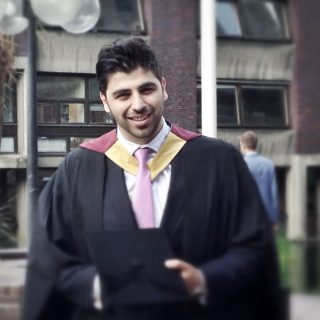
Before starting my Law Degree, I wasn’t too sure on what I wanted to do when I graduated. I was undecided between finance and law. However, I went with my guts and started a law degree, which I started at City Law School in September 2011.
The first week at university was daunting coming straight out of college, but I decided I need to live up to the commitment. Studying law isn’t just about the studying if you want success; it’s about acting the role, talking the talk, proving to yourself that you have what it takes to face the world, alone!
‘Does anybody want to run as student representative’ said Margaret Carran, the head of the LLB at that time, whilst we all sat in the Oliver Thompson Lecture Theatre at City University. I answered affirmative and was invited to give a speech before approximately 200 people for votes. It was intimidating but to sooth myself I thought if I can’t do it now, I can never do it before a panel of judges at a Supreme Court, or even before prospective investors at a bank.
I finished my talk and was bombarded by questions on the procedures I would take to represent the students. Feeling as if I had applied for presidency, I answered with full force and ambition, generating majority votes and securing the position, an achievement that pushed my confidence and belief in myself a mile further.
From then, I focused mainly on a career as a Barrister, knowing I had the confidence to speak publicly and share my opinion and beliefs fearlessly. The following year I took on the responsibility of becoming a Student Ambassador. On top of this I enhanced my bar career prospects further by securing four mini pupillages, networking, becoming a legal advisor at a charity, representing for the FRU, undertaking pro-bono social welfare cases and representing clients at tribunals. I also participated in external and internal mooting competitions, whilst securing two solicitor internships – all during my three year law degree.
I was always advised to study hard and shop for experience later, but having a wife and daughter to support, I couldn’t afford a gap year of experience and so I jumbled them all up together and made the three year law degree the most productive three years of my life.
Being shortlisted for an unsuccessful interview at Lincoln’s Inn gave me more blind hope of eventually succeeding at the Bar and securing a BPTC place at three law institutions bloated my head further, but I didn’t want to go straight in. I decided to go back to my pre-university ambition of working in the financial industry.
Coming close to graduating with no concrete career path, I decided to spend my final year at university applying for opportunities in a bank. I didn’t have a clue which position to apply to and had little hope of succeeding as my CV was built mainly on a career in law, with hardly a financial element in it. Not mentioning my degree major, I thought it was near impossible, but I applied anyway. That year, I submitted more than 25 applications and completed more than 60 online tests, ranging from judgmental tests to numerical reasoning tests, one being harder than the other, especially balancing with my final year studies and work commitments, I was near giving up.
Then, I started getting the phone calls and interview requests. The most notable two was a call from Bank of America Merrill Lynch’s Global Investment Banking Division in Dubai and HSBC’s Corporate Banking Division in London. I made it through their robust application sieving process and I reached the easy part, time to celebrate! Not really, this bit proved harder.
‘How do you value a company?’
‘What is discounted cash flow?’
‘Where do you invest?’
‘What aspects of Facebook’s and WhatsApp’s M&A would be of interest to you and why?’
Of course, now, answering such questions is a piece of cake after intensive reading but at the time of the interview with the Vice President of Bank of America, I only knew law! I could have well answered ‘what money laundering regulations must banks comply with’ or ‘to what extent do financial institutions who arrange and syndicate credit facilities on behalf of their clients make implied representations or owe duties of care to the banks and financial institutions who are invited to participate in the credit facility post IFE Fund S.A. v Goldman Sachs International’, etc. That interview didn’t go as well as I had hoped, most importantly as I had applied to a ‘off-cycle internship’ without knowing that the only training would be ‘in-the-job’!
I was advised to apply for a different position the following year but instead decided to apply to another bank’s Corporate Banking Division, HSBC. The interview was more straightforward, being asked why I wanted to work for the company, situations where I helped people, how I would fit in with the company’s goals, etc. Succeeding the initial telephone interview, I was invited to an assessment centre. The full day event included a role-play between a banker (me) and a corporate entity wanting a loan for a proposed investment. I was invited to ask questions in five minutes to gather enough information to assess the risk involved in the project and whether the bank should approve the loan, explaining the reason for my decision. The other activity was an essay-like 55-minute assignment where I had to write to a branch manager advising of the necessary steps needed to be taken to improve the branch efficiency after analysing 11-pages of data regarding the running of the bank. Then followed a group exercise and various other interviews. We were under surveillance for the whole day, with eyes on our every gesture or action. A few weeks later, I got the job offer to start in October 2014.
How I succeeded here was pretty simple. Although I had only law related experience, I worded my applications and interview answers towards what the employers are looking for, so, instead of saying I was representing clients at court, I would say I take on clients cases, analyse their evidence and defence, apply the relevant laws and reach an outcome strong enough to advocate in court where I would attend the hearing and plead my client’s case before a judge, being able to think effectively and efficiently under pressure, publicly speak and answer unprepared questions on my feet to my clients best interest. This would give the interviewer an impression that I am able to analyse and apply, I am confident enough to speak publicly with interpersonal skills and abilities to build a quick rapport with the client; I can work efficiently under pressure and keep my clients best interest in mind.
The way you turn and twist your experience is more important than doing the experience itself and learning to do this would mean that anything you ever do in any profession, you would be able to mix, match, twist and turn to make it relevant to a completely different profession, easily.
What I therefore learnt from graduating with a law degree is that even if you don’t become a lawyer straight away, you would be able to join ANY other profession of your choice, whether in finance or retail, a law degree is an armor that would prepare you for the fiercest of battles you face as a young adult embarking on a successful career in the most competitive of eras. Why? Because it gives you invaluable communication skills, ability to think under pressure, ability to analyse and apply efficiently, knowledge of the laws and regulations dealing with most professions and customers, and most importantly, society’s view – law graduate = smart kid! ;)
Good luck folks and bear in mind, the more you put, the more you gain. Your future is in your hands.
Many thanks to Saad, who graduated from his LLB in June 2014.

